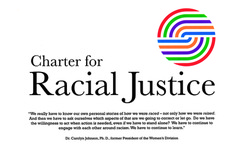From unitedmethodistwomen.org:
LENT: Forty Days of Racial Justice
Ash Wednesday – by Janis Rosheuvel and Julie Taylor
 Pray
Pray
God of quiet and wonder,
God of the shallow, babbling brook and the deep, wavy ocean,
God of soft snow falling and hard, driving rain,
God of flowing tears and hearty laughter,
God of strong handshakes and soft eyes,
God of colored, falling leaves and sprouting green shoots,
God of life and seasons,
God of wilderness days and baptism rivers,
God of fasting and feasting,
God of prayer and contemplation,
God of Scripture and tradition,
We come to Ash Wednesday at the beginning of this Christian season of Lent. Open our hearts to you as the Bringer of New Growth. Open our minds to you as the great Creator of the Universe. Open our hands to you as the great Designer of Nature. Open our souls to you as the Embodiment of Love. May we receive the ashes of remembrance and wear them as a sign of your great love for us and our commitment to let your Spirit of radical welcome live itself out through us. In Jesus’ name, Amen.
Learn
There is a time for all things under heaven – a time to be born and a time to die …
— Ecclesiastes 3:2
Ash Wednesday begins the season of Lent. In the Christian year, this is a 40-day period set aside for reflection and meditation. It reminds us of the 40 days and 40 nights that Noah spent in the ark, fleeing the flood. It is reminiscent of the 40 days that spies spent in Canaan before returning with their report – two who were hopeful and the rest who were afraid – and how that faithlessness led to the 40 years the Israelites spent in the wilderness between Egypt and the Promised Land. It reminds us, too, of the 40 days Moses spent, twice, on the mountain to receive the Ten Commandments and the 40 days that Jesus spent fasting in the wilderness, enduring temptation. Preparation and change takes time. So what should the next 40 days mean to Christians? What should it include? It will mean different things to different people but here are some things that we might consider together.
Let me invite you to participate in some weekly time to focus on your role in bringing about change. United Methodist Women has historically taken stands on issues of racial justice. In the early days, our organization and the women in it set about fighting lynching. Their choice for leadership when they were brought into the structure of The United Methodist Church was to have an African-American woman lead them. They formed the first Charter for Racial Justice, something the larger church would not embrace until years later. The first Assembly was moved from a city that would not house ethnic minorities in the same hotel as white women to a city that would. In the current organization there are efforts on the national and conference levels to continue to live out the vision of the Charter for Racial Justice. Each week this Lent, we will look at the theological and biblical foundations for working to achieve racial justice. Each week we will be invited to consider how we can intentionally be involved in working towards racial justice in our church, our community and our world. Each week we will explore individual and collective responses to racial injustice and what role we might play in ending systemic racism in our church and society.
Read the three accounts of Jesus’ forty days fasting in Matthew 4, Mark 1 and Luke 4 on bible.oremus.org.
Mentor
Find a friend or small group that you will contact during these 40 days to share what you are thinking, who will help you do some serious soul searching about your own racial justice work. Let this friend or group be your prayer partner(s) for these coming days and your ally or allies in the commitment to create mutuality and justice for everyone.
Transform
Begin this Lenten season’s racial justice reflections by fully reviewing and discussing the Charter for Racial Justice. The Charter is one of the key documents we use to ground our institution’s work for racial justice.
Use the following questions to delve deeper into how the Charter can be applied to help us realize a more racially just United Methodist Women and world:
- Why does the Charter call the work for racial justice a “struggle”?
- What does racism rob from people of color and white people?
- How is racism about power?
- What do we, as individuals and as a society, need to sacrifice to end racism?
Janis Rosheuvel is executive for racial justice for United Methodist Women. Julie Taylor is United Methodist Women’s executive for Spiritual Growth.
